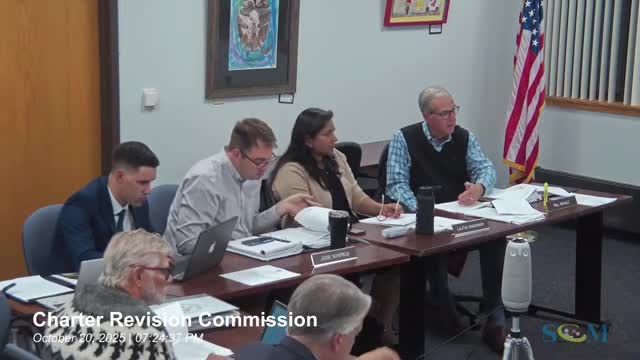Panel clarifies borrowing, audit and finance oversight language; debates tax anticipation notes and reporting frequency
Get AI-powered insights, summaries, and transcripts
Subscribe
Summary
The commission reviewed proposed charter language clarifying long- and short-term borrowing authorizations, the role of the Board of Finance in audits, and the board's access to financial reports (monthly vs. quarterly). Members also debated whether tax anticipation notes require special handling.
Charter revision members considered detailed changes to how the town's charter handles borrowing, audits, and the Board of Finance's oversight tools.
On borrowing, commissioners discussed reorganizing current charter language to make clear the difference between (a) approval to borrow (authorizing long-term indebtedness), (b) short-term notes (not exceeding one year), and (c) the separate contractual issuance step (signing debt instruments). Several members supported adding clearer, stepwise language so the charter mirrors current practice: the board of selectmen authorizes borrowing by resolution, typically on the recommendation of the Board of Finance, and long-term borrowing that creates an extended obligation should be submitted to voters as required. Commissioners questioned a vestigial exception for "tax anticipation notes"; several members recommended removing that exception so the charter treats notes consistently and so the approval path is clear. Staff and counsel noted the town's financial advisors and bond counsel normally participate and that timing of issuance can materially affect debt costs.
On audits and transparency, commissioners agreed to require that financial audit reports be filed with the town clerk and made publicly available on the town website. A proposed sentence that would allow the Board of Finance to require specialized or additional audits drew mixed responses: some commissioners supported explicit authority to obtain targeted financial examinations when warranted; others cautioned that the charter should not create a process that steps on the town manager's administrative authority. The commission agreed to keep audit reporting and public posting language while asking counsel to clarify how to permit Board of Finance-initiated financial examinations without implying implied statutory powers beyond those conferred by statute.
Members also debated the frequency of financial reporting to the Board of Finance. Several commissioners, including Chair Lisa Hevner, argued in favor of monthly financial reports as a transparency and early-warning best practice: "If you want transparency, and if you do, you should have monthly reports," she said. Staff noted the town already provides bottom-line monthly updates and quarterly, more detailed reports; counsel warned the charter should avoid locking future boards into overly prescriptive operational detail. Commissioners resolved to draft language that requires the Board of Finance to receive financial reports at a frequency it prescribes, consistent with the statutory quarterly minimum for school reporting, and to allow the board to request more detailed analyses as needed.
The commission asked staff and counsel to produce redlines that (a) clarify borrowing/issuance steps and approval authorities, (b) remove unclear exceptions for tax anticipation notes or make approval procedure explicit, (c) require public posting of audit reports, and (d) give the Board of Finance authority to request additional financial reports while preserving the town manager's role in directing staff work.
